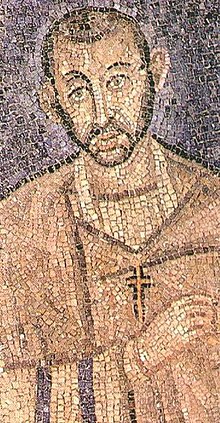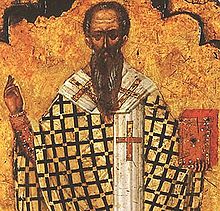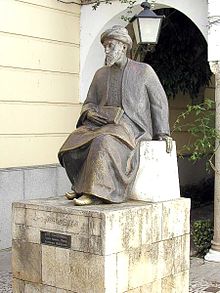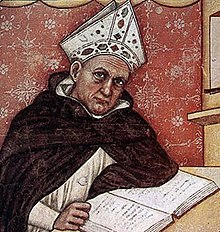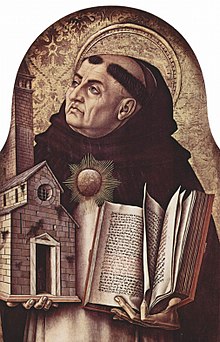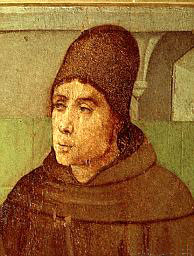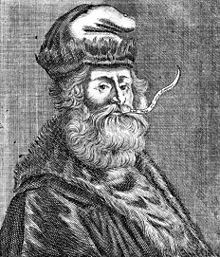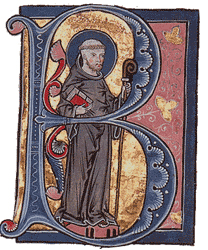Middle Ages Philosophy
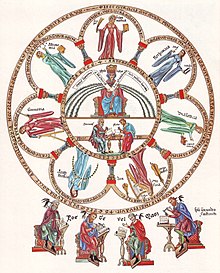
The philosophy of the Middle Ages in Europe includes very diverse currents that have developed from the end of antiquity to the Reformation . In the occidental culture it is shaped and supported by Christianity . Without reference to classical Greek philosophy , it would not be possible here either. In an attempt to convey knowledge and methods of antiquity and the present, the philosophical endeavor in a religiously shaped culture aims at a synthesis with religious belief. Understood in this way, it has its apex in natural theology . The same applies to many Jewish and Islamic thinkers of this era.
Delimitation of the Middle Ages
The European Middle Ages are not clearly defined. The beginning of this epoch used to be the end of the Western Roman Empire in 476, today it is more the end of late antiquity in the 6th century. Josef Pieper calls the year 529 a “symbolic” milestone - the closure of the ancient Platonic Academy and the foundation of the Benedictine Abbey of Montecassino . The beginning of the early modern period is dated to the invention of printing around 1450, the discovery of America in 1492 or the Reformation in 1517.
The term "Middle Ages" ( Medium aevum ) was introduced by the Renaissance to separate the previous period from antiquity . This was often associated with a devaluation: The Middle Ages were considered a "dark" epoch in which no free and humane philosophy could develop.
However, this judgment misunderstood the contribution that the philosophers of the Middle Ages made to the history of philosophy. Much of what the Renaissance, Humanism , Reformation and finally the Enlightenment formulated had already been laid out in their thinking .
Transition from late antiquity to medieval philosophy
Christian apologists and church fathers referred to philosophical teachings as early as the development of Christian theology in the 2nd century . The emerging Christianity had to dogmatically establish itself and assert itself against " heresies ". It also had to defend Christian teachings against competing schools of thought of Hellenism , but also religious groups of Gnosticism and Manichaeism . This was not possible without using philosophical terminology and method.
The patristic prepared foundations for the interaction and the synthesis of reason (knowledge) and revelation (faith), the philosophical designs subsequently co-determined. Philosophy - at that time mostly in the form of Neoplatonism - was included or subordinated to theology, but remained an integral part of it. In this regard, Christian patristicism can already be claimed as a preliminary phase of medieval philosophy, although it still belongs to antiquity.
The philosophical centers of that time developed primarily in Alexandria (Egypt) and Rome , and later increasingly also in Northern and Western Europe. After the Constantinian Revolution , the North African Augustine of Hippo created the main overall design of Catholic theology. He took up the questions of the Neoplatonic philosophy as a "front end" in his system, which was decisive for the next 500 years.
The supremacy of the Church preserved and spread Latin throughout Europe after the fall of the Roman Empire . In the Western world, the language of worship and science remained the same, so that philosophical discourses were conducted exclusively in Latin. In the High Middle Ages, this favored their claim to universality, which was not tied to national borders.
Patristic (up to Augustine)
The history of patristics is predominantly a piece of theological history . Historically, it actually belongs to late antiquity . In order to understand the origins of the philosophical positions of the Middle Ages - based on Augustine - an overview of this time is required. Patrism ran largely parallel to late antiquity, often in an ideological debate with Greek philosophy. There were also points of contact with the doctrine of virtue of the Stoa ( Seneca , Marc Aurel ) or skepticism ( Sextus Empiricus ). More important is the middle Platonism , as in Alexandria by the Jewish thinker Philo (1st century. N.) Was taught and the Neo-Platonism , the Plotinus (3rd century. N.) Founded. Many church fathers, often brought up through a Greek education, tried to combine Plotin's teaching of the indescribable One who emanates into the world in stages of being of the world spirit (emanation) with the Christian teachings. At the same time, patristicism is the phase of orientation and the development of solid teaching systems. The first teaching decisions ( dogmas ) are also made in this phase of Christianity and rule out deviating positions (heresies). With increasing recognition of Christianity, then also as the state religion (in the 4th century), with the simultaneous decline of the Roman Empire, the traditional Greek schools of philosophy faded more and more into the background.
Apostolic Fathers
In its beginnings, Christianity as a religion was shaped almost exclusively by its origins in Judaism and its traditions. With the rapidly beginning expansion in the Mediterranean area and the increasing number of Gentile Christians , the apostles, and especially the early church fathers, had to integrate their different cultural backgrounds with different questions and perspectives into the Christian faith. This was therefore an early task of the Apostolic Fathers, of whom predominantly only fragments or evidence are available in narratives . Hermas (c. 150), Ignatius of Antioch († c. 107) or Polycarp of Smyrna (c. 69–155 / 156) mainly wrote instructional letters that are similar to the New Testament apostolic church letters.
heretic
Under Gnosis (see also epistemology ) different are heretical positions of the 2nd and 3rd century summarized. It is usually typical that they want to achieve the knowledge of God above all spiritually and supplement Christian teachings with stories, myths and classical philosophy. At first they could hardly be distinguished from Christian teachers, but were discredited as false teachers by so-called orthodox authors. A distinction is often made between God and an additional world creator . The soul is perceived as an alien stranger on earth, but the human being contains a divine " pneumatic seed" which enables the return to the sphere of God, the pleroma , when the human being detaches himself from everything earthly. “Gnosis” thus refers to the knowledge of the transcendent and the way there. Important representatives were Basilides (around 133), Valentinus (around 150) and sewing also exist for Marcion of Sinope. As a rule, the Gnostics were limited in terms of time and place. The Manichaeism of the Persian Mani (216-276) had a far more extensive effect . According to Mani, the story is divided into three phases. At first the kingdoms of light and darkness faced each other separately. In the second phase, the creation of the cosmos , the two realms were mixed. The redemption arises in the third phase of world history , in which the light wins the upper hand over the darkness. As prophets of this time u. a. Buddha , Jesus and finally Mani.
Apologists
The apologists used classical philosophy to show the compatibility of Christianity with some traditional world views and to distinguish them from others. Their philosophizing was under the primacy of faith. For Justin the Martyr (around 100–163) the path to God only led through true philosophy, Christianity. Classical philosophy, on the other hand, cannot provide answers to final questions. This is only possible through the scriptures and the teachings of the friends of Christ. Athenagoras of Athens (approx. 130–190) turned to the emperor Mark Aurel with a petition . He was a converted philosopher, probably of the Platonic direction. A speech to the Greeks is known from Tatian as a student of Justin . Irenaeus of Lyon (120-200) was Bishop of Lyon, fought against heretics and, as he essentially defined what is heresy and what is orthodoxy , one of the founders of ecclesiastical dogmatics . Tertullian (approx. 160–225) was the first church father who wrote in Latin and thus created important terms in church Latin . For him, too, the primacy of scripture was valid, philosophy only had a supplementary function.
Clemens of Alexandria (approx. 150 - died after 215) was strongly influenced by Philo , a Jewish Alexandrian who, from the perspective of Judaism, is deeply concerned with philosophy: “ Because accepting the right teachings and rejecting the others does not enable you to do so simply belief, just knowledge based belief. “(After Heinzmann, 35). Clement of Alexandria appropriated the Platonic philosophy (which at that time was more of an outsider position) for Christian theology. The results of his thinking later became important and controversial topics of medieval philosophy:
- Considered and sensible action corresponds to the will of God.
- The ability to find faith through abstraction is a natural ability of the soul, more precisely of the spirit.
- Philosophy also serves to discuss what is recognized as correct in faith.
- However, belief ultimately determines the truth .
- The doubt of skepticism is self-contradictory.
- God himself is invisible and inexpressible.
- The truth is found in the scriptures he revealed.
Cyprian (200–258), on the other hand, who came from Carthage like Tertullian , represented infant baptism (i.e. baptism without conscious consent ) and saw faith as the pure grace of God.
Internal church problems brought the dispute over the so-called doctrine of the Trinity . The Christian presbyter Arius of Alexandria (256-336) denied the Trinity of God and saw in the son logos Although something divine but not God himself. In contrast, represented the Trinitarians with decisive leadership of the bishop of Alexandria Athanasius (to 298-373) the position of the essential identity of Jesus and God the Father. The dispute smoldered for over 50 years and led to numerous clerics being banished until it was officially resolved in 381 by the 1st Council of Constantinople in favor of the Trinitarians. However, Arianism lasted for another 300 years, especially under the Teutons and Goths , who were only gradually able to be incorporated into the Roman Church.
Theological systematizations
Origen (approx. 185-253) founded the concept of the allegorical interpretation of scriptures in order to avoid contradictions in the original texts of the Bible . His goal, too, was to deal with Greek philosophy in order to show Christianity as the “true philosophy”, especially to Neoplatonism . Philosophy has the task of penetrating the apostolic tradition, which is of divine origin. God is unknowable spirit beyond being and essence , who is the creator of everything through the logos.
Eusebius of Caesarea (approx. 260–337) is best known for his chronicles as the founder of church history . Hilary of Poitiers (315–367) was an authoritative representative of the Trinitarians, Gregory of Nyssa (335–394), as the father of the church, is particularly important for the Orthodox Church . In contrast to Origines, he taught the infinity of God and the Trinity . Ambrose of Milan (340–397) was a moderate Trinitarian, became known through the translation of theological writings from Greek and influenced the subsequent history, especially through the baptism of Augustine.
Augustine
One can call Augustine of Hippo (354-430) the real founder of Christian philosophy . He is at the same time the first “great” Christian philosopher of the first millennium after Christ. Although he was raised in a Christian way by his mother, to whom he had a close relationship, he led a casual life while studying rhetoric , had an illegitimate child with a married woman and cared little about religion. During his studies he came close to the still widespread Manichaeism , but found no satisfactory answers and turned to the skepticism of the New Academy . It was not until his encounter with Ambrosius while teaching as a rhetorician in Milan and his preoccupation with Neoplatonism that he became closer to Christianity. He was baptized, returned to North Africa and began his philosophical and theological work. At the insistence of being ordained a priest , he finally became Bishop of Hippo in 397 .
His reversal described Augustine in the "Confessions" ( Confessions ). At first he turned directly against the (overcome) skeptics with the statement later repeated by Descartes : Si enim fallor sum , that is, “if I doubt, I am”, God's state (XI, 26). The senses may be mistaken - this is the sphere of nature - but the truth of ideas, as in mathematics, remains indubitable. Because of his idea of a separate spiritual and physical world, Augustine saw a great proximity between Platonism and Christianity. The concrete individual is only a transitory image of real ideas . But the ideas themselves are contained in the spirit of their creator. God is the only immutable being that one can know by knowing oneself. Augustine explained evil as a lack ( privation ) of good, ie the "non-existent good", and dealt with the question of creation out of nothing ( Creatio ex nihilo ). The latter leads him to a philosophy of the time that is still relevant today.
With the assumption of ecclesiastical offices, Augustine's philosophical worldview gives way more and more to Christian-theological grounds. This becomes particularly clear in his doctrine of grace of 397:
- All human beings are fundamentally addicted to original sin . Corruption through original sin is dependent on the grace of redemption . This cannot be earned, but it is granted by God according to a standard that cannot be recognized by humans (double predestination ). The freedom is this, in a dialectical relationship: God has indeed given the freedom as a creator of man, but it enables man only to evil. The will of the good is again based solely on the grace of God.
- Faith precedes reason , but reason is important to confirm belief. Gaining knowledge is not a value in itself, but serves to strengthen the position of belief. Reason alone is too weak to find the truth. This requires the authority of the Holy Scriptures, even if in some cases they are to be interpreted allegorically. Faith is determined by authority. This consists in the scriptures and the institution of the church, which goes back to the apostles through discipleship .
In order to enforce his authority, Augustine also resorted to violence against Christian currents that were not loyal to the line, a position that he also put down in dogmatic writings against the Donatists and the Pelagians .
Pelagianism was founded by the Irish monk Pelagius (died around 418). He rejected original sin and attributed personal freedom of will to man. The consequence was man's responsibility for his sinfulness. After various attempts by Augustine, these teachings were declared inadmissible at the Council of Ephesus in 431, so that the idea of original sin as taught by Augustine prevailed. The distinction between the corporeal and the divine world led Augustine to justify the political separation of church and state in his contemplation of the state of God ( De civitate dei ) .
Middle Ages Philosophy
At the beginning of the 6th century translated Boethius the Organon of Aristotle and other writings to his logic into Latin and commented it. This remained the only Latin script of Aristotle in the Latin West until the 12th century . His Consolation of Philosophy ( Consolatio philosophiae ) was also a popular work that conveyed much of the knowledge of ancient Greek philosophy .
In the course of the Christianization of Europe, the monasteries were the training centers of the clergy . The knowledge of antiquity was preserved and passed on here. The so-called “ dark time ” according to Augustine up to around 800 did not produce any important philosophers. Until around 1100 in the Latin West, only a few thinkers such as Johannes Eriugena (9th century) and Anselm of Canterbury (1033–1109) developed new ideas.
In the east, however, the Greek-influenced Eastern Roman Empire (which was dubbed the Byzantine Empire in modern times) existed until 1453. Here, far more of ancient knowledge was preserved than in the west (cf. late antiquity ). Byzantine scholars passed this knowledge on to Western Europe in the 15th century and thus contributed to the development of the Renaissance (see, for example, only Georgios Gemistos Plethon and Bessarion ).
What is more decisive for the Latin West is the wealth of knowledge that it has acquired through translations by Arabic and, in some cases, Jewish philosophers. Philosophers such as Avicenna and Averroes commented on and continued the entire Aristotle.
It was not until the late 11th century that the philosophy of Western Europe took off in the context of a flourishing economy and population growth. In Bologna , Oxford and Paris were universities founded for theological training. The educational canon comprised the "seven liberal arts" ( Artes liberales ), divided into the trivium ( grammar , dialectics and rhetoric ) and the quadrivium ( arithmetic , geometry , music and astronomy ). These had to be mastered by the students first as a basic course before they were allowed to study theology or medicine as a major. Those who studied here received extensive training in all of the individual disciplines that were important at the time. The regional origin was insignificant in a time of high mobility and a lack of national borders. Latin made it possible to exchange knowledge between all regions. The unity of this body of knowledge corresponded to the Church's claim to a universal worldview.
This building soon got cracked. As early as 1100 the universal dispute showed the first cracks in the Christian synthesis based on the unity of thought and faith. The advocates of platonic-oriented “ realism ”, especially Wilhelm von Champeaux and Anselm von Canterbury, disputed with radical nominalists like Roscelinus about the priority of “thing” (res) and “sign” (noun, designation). Roscelinus was defeated and had to revoke.
His pupil Abelard also failed with his vocalistic variety: general terms have their being in the (pronounced) words. Abelard has become known for his dialectical juxtaposition of the pros and cons of a statement ( sic et non = "yes and no"). As with some of its predecessors, authorities for one side and those for the other are gathered on a systematic problem. The decisive factor is the method outlined in the prologue of the work. The so-called scholastic method of high scholasticism will build on this.
In the 12th century, the Byzantine and Islamic world was culturally and scientifically superior to Europe. Their scholars conveyed their progress in philosophy , medicine and mathematics and all other fields of knowledge to Western European universities and monastery schools. The work of Aristotle, which has long been known only in fragments in Europe, gains particular influence. Initially controversial and opposed, but effectively received by Albertus Magnus and his pupil Thomas Aquinas , Aristotelianism will dominate later centuries. First (1277) Thomas is condemned with other Aristotelians. Through harsh disciplinary measures in the 14th century, especially in the Dominican order, he became effective. In the 19th century the church committed itself to the Thomanian doctrine ( Thomism ), which stabilized its doctrinal identity until the middle of the 20th century, but often prevented further thinking.
With the strengthening of the universities, new sources of knowledge, the influence of secular rulers on the educational system, disciplines gain a status of their own that no longer allows them to be brought into a wisdom teaching structure under the auspices of theology. These are factors that enable the development of disciplines at all and thus work towards a separation of theology and philosophy.
Even in his day, Thomas's positions were not without alternatives. Even before the aristotle renaissance of the teaching building, the “school” of Chartres, following Boethius' philosophy, was conceived according to strict methodological principles and with great interest in natural phenomena.
Important philosophers, whose teachings oppose the Thomanic in many ways, are for example Roger Bacon , Johannes Duns Scotus and Wilhelm von Ockham . With an interest in experimental research and a strong emphasis on individual perception, they opened doors for the modern age . Many works of the political philosophy of the late scholastic period separate spiritual and secular power , for example Dante .
Parallel to a culture shaped by Aristotelian philosophy of science, there was a broad movement of mysticism , for which u. a. Hildegard von Bingen and Meister Eckhart are standing. Through Johannes Tauler, she also had an impact on Martin Luther .
The thinking of Nikolaus von Kues (* 1401) is today considered the high point of medieval philosophy and at the same time the transition from the late Middle Ages to the early modern period . The Renaissance philosophers did not assign this importance to it, as they saw their thinking as a break with the Middle Ages and a new beginning from the spirit of antiquity. But today you can see a more fluid transition in the two centuries from Cues to Descartes (* 1596).
Transition from antiquity to the Middle Ages
Boethius
Boethius (approx. 480-524) came from an elegant Roman family and had a classical education . He could still read the original Greek texts of Plato and Aristotle and was himself politically active. The fragment of an Aristotle commentary he wrote was for a long time the only source on Aristotle in the Western Middle Ages, in which knowledge of Greek had largely been lost. The early scholastic discussion on logic and conceptual analysis is based on this text. Boethius also discussed in detail the problem of universals raised in a commentary on Aristotle by Proclus, thus giving scholasticism a further important topic.
As Chancellor under Theodoric of this because of its commitment to an understanding with Ostrom sentenced to death, he wrote in the months leading up to his execution (probably in 525) his main work, the "Consolation of Philosophy" ( Consolation Philosophiae ). Although a Christian, he did not try to process his fate in contemplation but in dealing with philosophical questions. He also answered the theodicy question philosophically:
Everything in nature is reasonable. The evil that is carried into the world by man can only be overcome through the path to oneself in self-knowledge. The truth becomes visible when one overcomes the affects ( joy , hope , fear and pain ). Happiness does not consist in material goods, but in what lies within us. Unhappiness is just a misconception of what happiness is. Man always strives for the good. As long as he strives he is confronted with the imperfect. But the imperfect only exists because there is also the perfect; otherwise the imperfect could not be considered imperfect. But what is perfect, in which everything is good, is God. The perfect is (logically) earlier than the imperfect and thus the origin of all being . For Boethius, eternity is not an everlasting time, but a timeless state.
Dionysius Areopagita
Dionysius Areopagita (approx. 500) is the pseudonym of an unknown Neoplatonic influenced Christian author. His writings were of great importance for scholasticism and were among others. a. much quoted from Thomas Aquinas . In his teaching, the one is the divine. This is indivisible. When we talk about being , thinking or love , we have already made a differentiation. Such concepts are only appearances of the divine ( theophania ), they always already contain the aspect of multiplicity and opposition. The good is also only an appearance, although the idea of the highest good is probably the closest to the divine. Everything visible is only a simile for the invisible (in contrast to Aristotle, for whom in the end everything is substance ). To achieve union with the One, a three-step path is required:
- Via purgativa = purification from affects and sensory influences,
- Via illuminativa = enlightenment by recognizing the ideal structures in reason and finally
- Via unitiva = unification with the one through contemplative transcending the level of reason.
Just as there is an ascent to the One, there is also a three-tier hierarchy among authorities ( bishops , priests , deacons ) and among secular people ( monks , believers, penitents). Angels have only been thought of as non-material since Dionysius . According to Dionysius, the talk of God (theology) also takes three paths:
- via affirmativa = positive statements about God
- via negative = the negation of positive statements from insight into their inappropriateness
- via eminentiae = the encompassing, affirmative and negative statements crossing way
The philosophical-theological considerations that determine the via negative will occupy many medieval authors as so-called negative theology , who had to comment on the works of Pseudio-Dionysius, who was read with apostle-like authority.
scholasticism
Early middle ages
The transition period between patristic and scholastic did not produce any independent new thinking. However, there were a number of important people who played a decisive role in the transmission of ancient education in the early Middle Ages . Isidore of Seville (d. 636) wrote an encyclopedia called Etymologiae . Maximus Confessor (d. 662) wrote explanatory additions to Gregory of Nazianzen and Pseudo-Dionysius Areopagita. John of Damascus (approx. 675–750) was an Orthodox dogmatist in Syria and in terms of content is more likely to be attributed to patristicism. The Englishman Alcuin (around 730-804) headed the court school of Charlemagne , where he taught according to the Artes liberales , which he had declared binding by Charlemagne. He turned against the heresy of adoptianism , which saw Jesus as a person adopted by God, and is considered one of the keepers of Latin education and one of the founders of the so-called Carolingian Renaissance .
The same applies to his pupil Rabanus Maurus (780–856), who wrote his own encyclopedia De universo based on the work of Isidore . Notker Teutonicus (around 950-1022), head of the monastery school in St. Gallen , is considered to be the first Aristotle commentator of the Middle Ages, albeit in a language that at that time was hardly an option for higher education: Old High German . He translated u. a. Writings by Cicero , Boethius and Martianus Capella the allegorical introduction to his textbook of Artes liberales .
Johannes Scotus Eriugena (around 810–877) played a special role during this period . This was an Irish natural philosopher who u. a. translated the text of the Pseudo-Dionysius Areopagita from the Greek. Eriugena was also in the Augustinian tradition of Neoplatonism, but placed much more emphasis on reason (Periphyseon I, 69): “ Real authority seems to me to be nothing else than truth revealed by reason. “In addition, one can call him the first independent thinker after Augustine and the first in the Middle Ages to design a philosophical system. In his De Divisione naturae he made a distinction
- that which creates without being created (God as the cause of all being),
- that which creates and is created (ideas),
- that which is created without creating itself (beings in space and time), as well as
- that which is neither created nor creating (God as the goal of all that is), therefore God as the beginning and end of perishable man and his God-given ideas.
This model largely corresponds to the Plotinian doctrine of emanation . Eriugena rejected a predestination as taught by the later Augustine.
Early scholasticism
Early scholasticism is the time of school philosophy, in which outstanding thinkers no longer limited themselves to monastic contemplation, but wanted to question and discuss obvious contradictions in church teachings with arguments of reason. Often such discussions put them in danger. They were condemned as heretics and had to revoke their theses if they did not want to take any risks for life and limb. Nevertheless, there were always free spirits who stood up for reason out of conviction.
In the Last Supper dispute , Berengar von Tours (d. 1088) from the School of Chartres took the view that bread and wine should only be viewed symbolically in the Eucharist . His opponent, Lanfrank von Bec (1005-1089), did not want to hear reasons of reason, but only to follow the authorities, whereupon Berengar argued that he was created in reason in the image of God .
Anselm von Canterbury (1033–1109) did not want to contradict Augustine, but he differed significantly from him in that he applied the dialectic as a method to the Christian doctrine of God and thus showed that this could essentially be proven to be rational. In this sense he also carried out the famous ontological proof of God , in whichit is shown,purely semantically , that one cannot deny the existence of God without already having an idea of him and his perfection. Nevertheless, the primacy of theology was undisputed for him, so that he confessed with Augustine: Credo ut intelligam , ie “I believe in order to understand” (Proslogion, Chapter 1).
Petrus Damiani (around 1006-1072) was known for his fight against the immorality of the Roman clergy. He was the creator of the saying of philosophy as the "handmaid of theology" ( Philosophia ancilla theologiae ), with which he turned against the scholastics, especially Berengar and Anselm, who wanted to develop faith through reason. (The phrase goes back to Philo of Alexandria 's interpretation of Gen 16.1f, which Clement of Alexandria adopted; Origen uses Ex 3.22 and Ex 11.22 instead; Deu 21.11-13 was also frequently cited.)
As a young English scholar, Adelard von Bath (around 1090–1160) traveled to Spain to learn about Arabic science . On his return he translated a large number of Arabic scripts and repeatedly emphasized the superiority of the Arabic sciences, especially in the fields of medicine , mathematics and astronomy .
Gilbert von Poitiers (approx. 1080–1145), a student of Bernhard von Chartres , was a representative of realism in the universality controversy and was known conceptually through the distinction between God and deity as well as between individuality and singularity. He was sharply attacked by Bernhard von Clairvaux for his emphasis on reason .
Johannes Roscelinus von Compiègne (approx. 1050–1120) formulated a particularly radical version of nominalism , which led him into disputes, particularly with Wilhelm von Champeaux. Roscelinus went so far as to conclude from the assumption that the universals are nothing but names that there is also no Trinity, i.e. God the Father, Jesus and the Holy Spirit should also be understood as three natures or gods ( tritheism ). Roscelinus' theses were condemned and he had to revoke them.
Wilhelm von Champeaux (d. 1121) was a decided realist and prevailed in the universal dispute against Roscelinus. Wilhelm was the founder of the Saint-Victor monastery, which in the following years produced a number of representatives who can beattributed to mysticism . a. Hugo von St. Viktor (1097–1147, actually Count Hugo von Blankenburg), who on the other hand also showed an intense interest in nature. For Wilhelm the universal lay entirely in the individual .
Peter Abelard (1079–1142) was a student of both Roscelinus and Wilhelm von Champeaux. In the universals dispute he developed a mediating position that assumes that universals are neither in front of things (realism) norare they formed as designations after things (nominalism), but ratherarisepurely in the mind as an abstraction of individual things, i.e. in things ( in rebus ) lie. This position is also known as conceptualism . He became known primarily through his further development of the scholastic method, his logical writings and statements on ethics ( scito te ipsum = "know yourself") and philosophy of religion . In his work Sic et non he listed in question form in 158 chapters contradictions that arose from the texts of the Bible and the teachers of the Church Fathers in order to prove that theology needs the help of reason in order to make meaningful statements and in such doubtful questions Decisions to come. Abelard made a distinction between a term and its meaning , which man determines. For him, the good was only in the good intention, not in the result; H. compliance with formal rules. He turned against the prevailing doctrine that, by dyingonthe cross, God boughtthe rights to human beings fromthe devil, whichthe devil had acquired on the basis of original sin. For him, God was rather a God of love whograntsmanthe grace of redemption through his sacrifice . Abelard also campaigned for a peaceful relationship between the religions . He wrote a letter about the history of his defeats, in which he also describes the famous love affair with his student Heloisa and her tragic development. Due to his self-confident, constantly controversial demeanor and the teachings that sometimes differed significantly from Augustine, Abelard was in constant conflict with the Orthodox church representatives of his time, in particular Bernhard von Clairvaux, Wilhelm von Champeaux and his former student Wilhelm von Saint-Thierry . Abelard wassentencedtwice as a heretic .
Petrus Lombardus (approx. 1100–1160) wrote widespread sentences in which essential statements of patristicism, especially quotations from Augustine, were collected and put together in a systematic order. These sentences became a general textbook for several hundred years. Thomas Aquinas also wrote a comment on this, and Martin Luther himself commented on it.
Thierry von Chartres (died around 1155) was a teacher of the seven liberal arts, who, with recourse to Plato's Timaeus and stoic physics, interpreted the history of creation as a natural process. Behind this was the idea that God created the (four) elements, but otherwise the world went its own way. The importance of Thierry lies primarily in the fact that Nikolaus Cusanus made extensive use of his writings.
Wilhelm von Conches (d. After 1150) distinguished the understanding of things that are invisible like God or souls from the understanding of visible things. On the one hand there was God as power, wisdom and will, on the other hand there was an atomistic world. With him, too, a strongly physically shaped worldview is recognizable, which was also influenced by Plato.
John of Salisbury (1115–1180) learned from Abelard, Thierry of Chartres and William of Conches. Like Abelard, he represented conceptualism and was secretary to Thomas Becket . In this capacity he wrote an early state theory ( Policraticus ) in which he declared morality and virtues to be the duties of state representatives and justified the murder of tyrants . Even Arnold of Brescia was a pupil of Abelard. As a radical thinker, he represented the ideals of early Christianity , turned against the worldly power of the Pope and spoke out against bondage and serfdom .
Alanus ab Insulis ( Alain de Lille ) designed an axiomatic theology based on the model of Euclid , in which he starts from the unity of the one.
Islamic and Jewish Philosophy
Parallel to and earlier than Christian scholasticism, there were highly learned thinkers in the Arab and Jewish spheres of life who resorted to Greek philosophy. The Arab world had preserved much of the knowledge of the Greeks and was far ahead of Western Europe in medicine, mathematics and logic, not least because they had the complete writings of Aristotle . This situation only became apparent in the Christian world with the gradual conquest of Islamic territories e.g. B. in Spain ( Toledo School of Translators since 1130). With the translation of the Arabic scripts and, above all, the complete texts of Aristotle, a rethink arose that led to a reassessment of philosophy in the university scholasticism.
Al-Farabi (870–950) translated Greek texts, worked with Aristotelian logic, dealt with mathematics and music, and used both Plato and Aristotle for his philosophy.
The book of recovery , written by Avicenna (980-1037) (Ibn Sina) and considered to be a basic medical work , has been used as a textbook for centuries in both the western and eastern world. This also contained parts on logic , mathematics and metaphysics , which have Neoplatonic features. If one had perceived one's position in scholasticism, the universal dispute would quickly have lost its importance. For Avicenna the universals lay before things in the divine mind, in things as the form of objects of nature, and behind things in the abstract concepts of man. For Avicenna the world unfolds out of the divine, which is the one, the perfect and the good.
For the Jewish Neoplatonist Solomon ibn Gabirol (1020-1068), the divine will is the source of life. That which is created by God is matter , also the spiritual . The first thing created is God's will, which mediates between God and the world. Averroes (1126–1198) (Ibn Ruschd) wrote extensive commentaries on Aristotle, so that Thomas Aquinas called him only "The Commentator" without any addition. The individual soul is indeed mortal, but the spirit of people as a whole is immortal. Religion explains the world to the masses in pictures and symbolically . Philosophy does not contradict this, but it must explain the world out of reason.
The Jewish thinker Maimonides (1135–1204) wanted to lead doubters back to faith through reason. For Maimonides, too, religion takes precedence over reason, as it is above all justified by Aristotle. However, biblical texts that contradict reason are to be interpreted allegorically . In ethics, too, he leaned largely on Aristotle. Levi ben Gershon (1288-1344) spread the teachings of Averroes and, like him, represented the merging of the individual soul into the world soul.
High school
High scholasticism became the prime of Aristotelianism. Compared with Augustine's rejection of the natural sciences and the strongly subordinate role of reason, there was now a further opening and liberalization. On the other hand, those who resisted an overly intensive mixture of church, state and science came under pressure. At first, natural science was understood in a completely Aristotelian way as pure observation. It was only gradually that there were individual thinkers who demanded the exploration of nature through experiments, because this was the only way to gain real new knowledge. One of the main points of contention in high scholasticism was the question of whether the individual soul is mortal and only its spirit or part of reason, as a common reason (intellectus), is eternal and immortal , as is the consequence of Aristotelian philosophy in the Averroes tradition or whether the individual soul, including its vegetative and sensitive abilities, is immortal, as required by the Christian doctrine of the resurrection. The latter position was the official doctrine, while the radical Aristotelian counter-position as averroism was banned. Robert Grosseteste (1170–1253) was Roger Bacon's teacher and had a relatively keen interest in scientific questions. Alexander von Hales (1170–1245) was an Aristotelian and was the first to write an extremely extensive work of formalized qaestiones based on the scholastic method . St. Bonaventure (1221–1274) placed significantly more emphasis on enlightenment through God than his teacher Alexander von Hales . He emphatically denied that an independent philosophy was possible. According to him, philosophy is always related to God. Therefore it is related to theology, which in turn is supposed to flow into mysticism .
Albertus Magnus (1200-1280) got his nickname because of his tremendously broad and extensive knowledge, especially in the natural sciences . He was one of the first to process the newly translated works of Aristotle and carried out intensive research on nature. He saw theology, philosophy and natural sciences rather as independent disciplines, each of which should also be dealt with subject-specifically. Accordingly, it is important to distinguish between scientific and theological knowledge. He was the teacher of Thomas Aquinas and laid the foundations for his work.
The Holy Thomas Aquinas (1225-1274) is considered the most important philosopher of the Middle Ages and created a very extensive work. For Thomas too, theology remained the first science to which philosophy was subordinate. However, it is considered to be of great merit to Thomas to have brought questions of science into harmony with theology.
His definition of truth, the adaequatio rei et intellectus , is famous . H. the correspondence of object and mind. He saw natural knowledge as fundamentally also decisive for theology. Only where the doctrines of revelation such as B. the Trinity, the sacraments , the last judgment or the virgin birth go beyond the recognizability for reason, these are decisive.
It is due to Thomas that all of Aristotle's logic, ethics and psychology can be considered compatible with the teachings of the Church. In particular, the distinction between substance and job is essential for his system. Individual things arise from the fact that the matter is determined by the form . The basic forms of space and time are inseparably attached to matter. The highest form is God as the cause ( causa efficiens ) and as the end purpose ( causa finalis ) of the world.
In ethics, Thomas supplemented the four classic cardinal virtues with the three Christian virtues of faith, love and hope. The highest good is the direct contemplation of God. The highlight of his work is his systematic work Summa theologica . He took the five proofs of God at the beginning of this writing as proof that one can also justify faith out of reason, cf. and natural theology . From Pope Leo XIII. his work was declared to be a binding Christian philosophy for the Catholic Church in 1879 , which is still valid today (see also Neuthomism ). In philosophy, his comments on Aristotle are still considered significant today.
As a teacher at the Paris Artistic Faculty, which had finally included Aristotle's writings in its teaching program in 1255 after several previous bans, Siger von Brabant (d. 1284) and Boetius von Dacien (d. 1286) demanded that Aristotle's teachings also be philosophical to be able to interpret conclusively where they contradict theology and revelation . It is precisely with regard to the question of the mortality of the individual soul that they deviate from official church teaching. They are sharply criticized by Thomas, and a catalog of 219 averroistic doctrines is condemned by the Bishop of Paris in 1277.
Late scholasticism
In late scholasticism the pendulum swung again. Many thinkers now recognized that a doctrine of faith based purely on logic and reason was no longer tenable and called for the separation of faith and reason. Education spread more and more through the progressive establishment of new universities and gradually passed over to bourgeois circles who no longer earned their living within the framework of church institutions. Consequently, the call for separation of church and state became louder.
Roger Bacon (1214–1294) had a scientific education and used his private assets for experiments . With practical research he stood in contrast to the usual attitude of the scholastics, who wanted to draw knowledge solely from reason. Bacon mainly opposed prejudice , habit, and lack of self-criticism . Knowledge from reason alone is not possible. Above all, this requires experience . Because of this attitude he can be seen as one of the forefathers of British empiricism .
Petrus Hispanus (1226–1277) wrote a compendium of logic, Aegidius Romanus (1243–1316) wrote a catalog of 95 false teachings against the radical Aristotelians. Heinrich von Gent (1217–1293) resisted the intellectualism of Thomas and called for a return to Augustine and to recognize the primacy of the will.
Johannes Duns Scotus (1266–1308) is considered to be the great antithesis to Thomas Aquinas. As a keen logician and mathematician , he turned against the too strong connection between reason and belief. The will has priority over reason. That is why the intellectual trimmings of faith are to be rejected. Original thinking is confused and unclear. Man is determined by urges and feelings of pleasure and displeasure. Only the will is able to overcome them. The good is determined by the will and is higher than the true. When the will is directed towards God, it achieves the good in love.
Dietrich von Freiberg (around 1250–1320) researched among other things the principle of the rainbow . Dante Alighieri (1265–1321) was strongly influenced by Thomism , but already showed the way to the Renaissance by designing a state concept that was independent of the Church.
Wilhelm von Ockham (around 1280–1347) made significant contributions to formal logic and the philosophy of language . The " Ockhamsche razor "named after himis an economic principle (" Frustra fit per plura quod potest fieri per pauciora " = It is free to do something with more that can be done with less; Summa Totius Logicae I, 12). The underlying understanding is that theories only one model is that the reality to explain as simply as possible, because it is the nature in its complexity probably can capture (anyway) not.
In the universality dispute, Ockham was a nominalist, whereby the concepts are not images of things, but only signs . For Ockham, neither the existence of God nor its properties could be proven by reason. But to believe the unprovable is a meritorious act of will. Self-knowledge has the highest certainty . Ockham advocated a separation of church and state . Both are legitimate authorities. The latter has the task of promoting the common good. With this view he came into conflict with the Pope and had to seek protection from persecution with Ludwig IV of Bavaria in Munich .
Raimundus Lullus (1232-1316) was a well-traveled globetrotter who can be classified as an Averroist. He invented a template with seven concentric circles on which he could read combinations of terms that, according to his testimony, could reveal corresponding truths. Nikolaus von Oresme (approx. 1330–1382) dealt with a number of scientific questions, used mathematical concepts and found factual errors in Aristotle. He took the view that new ways of looking at things were also permissible and even considered a heliocentric worldview to be possible. Marsilius von Inghen (approx. 1335-1396) was a co-founder of the University of Heidelberg . Johannes Buridan (approx. 1300–1358) was rector of Paris University and dealt with questions of free will. His example of a donkey is famous that stands exactly in the middle between two haystacks, cannot decide which one to go to and starves over it. Pierre d'Ailly (1350-1420) is considered a philosophical skeptic who taught the primacy of the will. Perception is only the external relation to nature that can be changed by God.
Philosophical mysticism
Bernhard von Clairvaux (1090–1153) is best known for his fight against so-called heretics such as Abelard, Gilbert de la Poirée or Wilhelm von Conches. To him, knowing for the sake of knowing is pagan. The real virtue of the Christian is humility .
Hildegard von Bingen (1098–1179) wasbarred fromparticipating in the university discourse of her timeas a woman. She wrote general rules of life and a number of medical texts on a multitude of critical questions of daily and Christian life. Amalrich von Bena (d. 1206) spread pantheistic notions according to which Godlivesin all creatures , so that his followers were systematically persecuted. Joachim von Fiore (1135–1202) developed a historical-philosophical view of the Bible by equating the Old Testament with God, the New Testament with Jesus and the time up to the Last Judgment with the Holy Spirit. Based on calculations from the Bible, he expected the Last Judgment in 1260.
The outstanding theme of Meister Eckhart (around 1260–1328) is the unification of the innermost with God. As a Dominican he succeeded Thomas and as a teacher in Paris and Cologne was a representative of classical philosophy and theology. But for him reason was not perfect without contemplation . Only through the internalization of the word does the human soul find the incomprehensible and ineffable divine source of things, which manifests itself in all of nature. Through this God is born in our soul, which becomes one with God. Eckhart's pupils and successors are Heinrich Seuse (1295–1366) and Johann Tauler (1300–1361).
See also
- List of Latin philosophers # Middle Ages
- Society for Philosophy of the Middle Ages and the Renaissance (GPMR)
literature
Philosophy bibliography : Philosophy of the Middle Ages - Additional references on the topic
- Series Herders Library of the Philosophy of the Middle Ages . Freiburg 2005ff.
Introductions, compendia, reference works
- Alain de Libera : The Medieval Philosophy. Wilhelm Fink Verlag, Munich 2005, ISBN 3-8252-2637-9 .
- Alain de Libera: Thinking in the Middle Ages. Wilhelm Fink Verlag, Munich 2003, ISBN 3-7705-3242-2 .
- Arthur Hilary Armstrong (Ed.): Cambridge History of Later Greek and Early Medieval Philosophy . Cambridge 1970.
- Peter Dronke (Ed.): A History of Twelfth Century Western Philosophy . Cambridge 1988.
- Kurt Flasch : Philosophical Thinking in the Middle Ages. From Augustine to Machiavelli. 2nd edition Reclam, Stuttgart 2001, ISBN 3-15-018103-8 .
- Kurt Flasch: Introduction to the Philosophy of the Middle Ages. 3rd edition WBG, Darmstadt 1994, ISBN 3-534-04570-X .
- Jorge JE Gracia, Timothy B. Noone (Eds.): A companion to philosophy in the Middle Ages (Blackwell Companions to Philosophy) . Blackwell, Malden / Mass. 2002, ISBN 0-631-21672-3 .
- Norman Kretzmann (Ed.): Cambridge History of Later Medieval Philosophy . Cambridge 1982.
- John Marenbon : Early Medieval Philosophy (480-1150): an introduction . London 2nd A. 1988.
- John Marenbon: Later Medieval Philosophy (1150-1350): an introduction . London 1987.
- John Marenbon (Ed.): The Routledge History of Philosophy . Vol. 3 (The Middle Ages), London 1998-2003.
- John Marenbon: Medieval Philosophy (Routledge History of Philosophy) . Routledge, London-New York 2008.
- Benoît Patar: Dictionnaire des philosophes médiévaux , Fides, Québec 3rd A. 2006, ISBN 2762127416 .
- Peter Schulthess , Ruedi Imbach : Philosophy in the Latin Middle Ages. A handbook with a bio-bibliographical repertory. Artemis & Winkler, Düsseldorf a. a. 2000, ISBN 3-7608-1218-X .
- Loris Sturlese : The German Philosophy in the Middle Ages. From Boniface to Albert the Great (748–1280). Beck, Munich 1993, ISBN 3-406-37749-1 .
- Friedrich Ueberweg , Bernhard Geyer : The patristic and scholastic philosophy. 11th edition (reprint) WBG, Darmstadt 1967.
Anthologies
- Richard N. Bosley, Martin Tweedale (Eds.): Basic Issues in Medieval Philosophy: Selected Readings Presenting the Interactive Discourses among the Major Figures . Broadview Press, Peterborough / Ont. 1997.
- Kurt Flasch : History of Philosophy in Text and Representation . Volume 2: Middle Ages. Reclam, Ditzingen 1986.
- Arthur Hyman , J. Walsh (Ed.): Philosophy in the Middle Ages . Hackett Publishing Co., 1983.
- Norman Kretzmann , Eleonore Stump (Eds.): The Cambridge Translations of Medieval Philosophical Texts. Vol. 1: Logic and the Philosophy of Language . Cambridge University Press, Cambridge 1988.
- Arthur Stephen McGrade, John Kilcullen, Matthew Kempshall (Eds.): The Cambridge Translations of Medieval Philosophical Texts. Vol. 2: Ethics and Political Philosophy . Cambridge University Press, Cambridge 2001.
- Richard McKeon (Ed.): Selections from Medieval Philosophers . 2 Vols. Charles Scribner's Sons., New York 1929 (Vol. 1: Augustine to Albert the Great. Vol. 2: Roger Bacon to William of Ockham).
- Robert Pasnau (Ed.): The Cambridge Translations of Medieval Philosophical Texts. Vol. 3: Mind and Knowledge . Cambridge University Press, Cambridge 2002.
- Andrew B. Schoedinger (Ed.): Readings in Medieval Philosophy . Oxford University Press, New York 1996.
- Herman Shapiro (Ed.): Medieval Philosophy: Selected Readings from Augustine to Buridan . The Modern Library, New York 1964.
- John Wippel , AB Wolter (Ed.): Medieval Philosophy . Free Press, New York 1969.
Web links
- Scott MacDonald, Norman Kretzmann: Medieval Philosophy , in E. Craig (Eds.): Routledge Encyclopedia of Philosophy , London 1998.
- Paul V. Spade (2004): Medieval Philosophy. In: Edward N. Zalta (Ed.): Stanford Encyclopedia of Philosophy .
- Paul V. Spade: A Survey of Medieval Philosophy (PDF; 1.8 MB), 1984
- George F. McLean / Patrick J. Aspell: Medieval Western Philosophy ( February 8, 2013 memento in the Internet Archive ), Washington, DC: The Council for Research in Values and Philosophy (I-9) 1997
- Bibliotheca Scholasticon ( Memento of August 18, 2006 in the Internet Archive ) Collection of links to primary texts by medieval authors
- Karl Vorländer : "Middle Ages" , in: History of Philosophy (1902)
- List of links to the philosophy of the Middle Ages ( Memento from May 26, 2008 in the Internet Archive )
- Josef Rauscher: Annotated literature list , Eichstätt
- Philosophia Islamica, Islamic philosophy Online
- Eileen Sweeney (2002): Literary Forms of Medieval Philosophy. In: Edward N. Zalta (Ed.): Stanford Encyclopedia of Philosophy .
- Andreas Greitzke: Is there a medieval philosophy? Lecture transcript (1994) Prof. Jan A. Aertsen
- Simo Knuuttila / Sten Ebbesen u. a. (Ed.): Knowledge and the sciences in medieval philosophy : proceedings of the Eighth International Congress of Medieval Philosophy (SIEPM), Helsinki 1990
- Peter Christian Jacobsen: List of Latin authors and anonymous works of the 13th century , Erlangen 2002.
- Proceedings of the Illinois Medieval Association , Essays in Medieval Studies, Volume 1 (1984) - 17 (2000)
Individual evidence
- ^ Josef Pieper: Philosophers and theologians in the Middle Ages. Verlagsgemeinschaft topos plus, Kevelaer 2015, ISBN 978-3-8367-1011-4 , (first edition 1960), p. 19
- ↑ Augustine: Letter No. 37 "Ad Simplicianum"
- ↑ Augustine: Letter No. 120 "Ad Consentium" (3 and 4)
- ↑ Cf. B. Baudoux: Philosophia "Ancilla Theologiae" , in: Antonianum 12 (1937), 293–326
- ^ Rainer Berndt : Sankt Viktor, school of . In: Theologische Realenzyklopädie (TRE), Vol. 30, Berlin / New York 1999, pp. 42–46, here p. 43.


